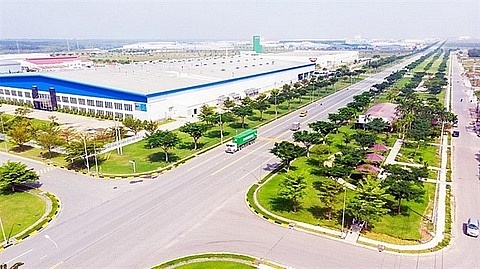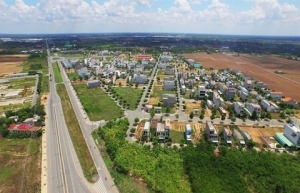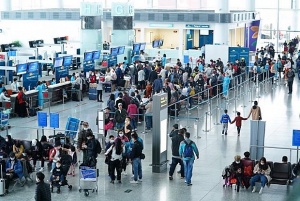INTERNATIONAL INVESTMENT
AND PORTAL
The People's Committee of Hanoi is considering withdrawing investment certificates from slow-moving industrial cluster projects.
The measures would apply for projects that have still to make progress 12 months after the issue of investment certificates, according to Decision 33/2022 on the regulation on management of industrial clusters in Hanoi effective from October 14, 2022.
 An industrial cluster in Hanoi. The city has solutions to promote further development of industrial clusters in the future. — Photo baocongthuong.vn
An industrial cluster in Hanoi. The city has solutions to promote further development of industrial clusters in the future. — Photo baocongthuong.vn
This decision includes regulations on the establishment and adjustment of industrial cluster development plans; and building and expanding the industrial clusters.
It also contains regulations on carrying out projects on building technical infrastructure of industrial clusters.
The decision also has regulations for State management offices relating to the operation of industrial clusters in the city, including cooperation and responsibilities between the offices and authorities of districts in Hanoi to improve the efficiency of industrial cluster management.
Those aim at ensuring consistency and creating favourable conditions for investors in investing in production and business in the industrial clusters.
According to the Hanoi Department of Industry and Trade, the State agency managing industrial clusters in Hanoi, there are 70 industrial clusters operating in the city, attracting about 3,900 households and enterprises to invest in production and business activities.
In the 2018-2020 period, Hanoi decided to establish 43 new industrial clusters, meeting demand for the development of industrial sectors.
However, the city has so far started construction on just seven industrial clusters due to many difficulties. They include Dai Thang and Phu Tuc projects in Phu Xuyen district; Di Nau project in Thach That district; Thang Loi and the second stage of Tien Phong projects in Thuong Tin district; the second stage of Dan Phuong project in Dan Phuong district; and Vong Xuyen project in Phuc Tho district.
The progress of building the industrial clusters in Hanoi is still very slow compared to the plan due to overlapping regulations, procedures and permits, according to the department.
Especially, the procedures on getting the Prime Minister's approval on changing the purpose of land use still takes time, affecting site clearance and issuance of construction permits.
About 20 industrial clusters must get permission on changing the purpose of land use from agriculturial land to industrial land, while only three of them have so far received approval.
In addition, the site clearance work is still slow, not meeting the building schedule. At present, 16 industrial clusters are not yet eligible for site clearance, and some have less than 50 per cent of site clearance completed.
In the future, localities will continue to review existing industrial clusters and remove those no longer suitable for development, and renovate operating ones.
The department will continue to closely coordinate with relevant departments, sectors and authorities of districts to remove difficulties in building technical infrastructure at the industrial clusters.
It also promotes the development of more large-scale industrial parks and clusters in an environmentally-friendly manner, and high-tech industrial production such as microchips and electronic equipment for export.
According to the Hanoi Industrial Cluster Development Plan by 2030, the city will have 159 industrial clusters with a total area of more than 3,200 hectares.
 Hanoi to inspect violations of plots and ground sales
Hanoi to inspect violations of plots and ground sales
Hanoi authorities have requested the Department of Natural Resources and Environment strictly handle the bulldozing of hills and mountains and levelling of ponds, rivers and streams to sell land.
 Hanoi-Ho Chi Minh City among world's busiest domestic air routes
Hanoi-Ho Chi Minh City among world's busiest domestic air routes
The Civil Aviation Authority of Vietnam (CAAV) has just announced that the Hanoi-Ho Chi Minh City route is listed in the world's four busiest domestic air routes.
By VNS



















